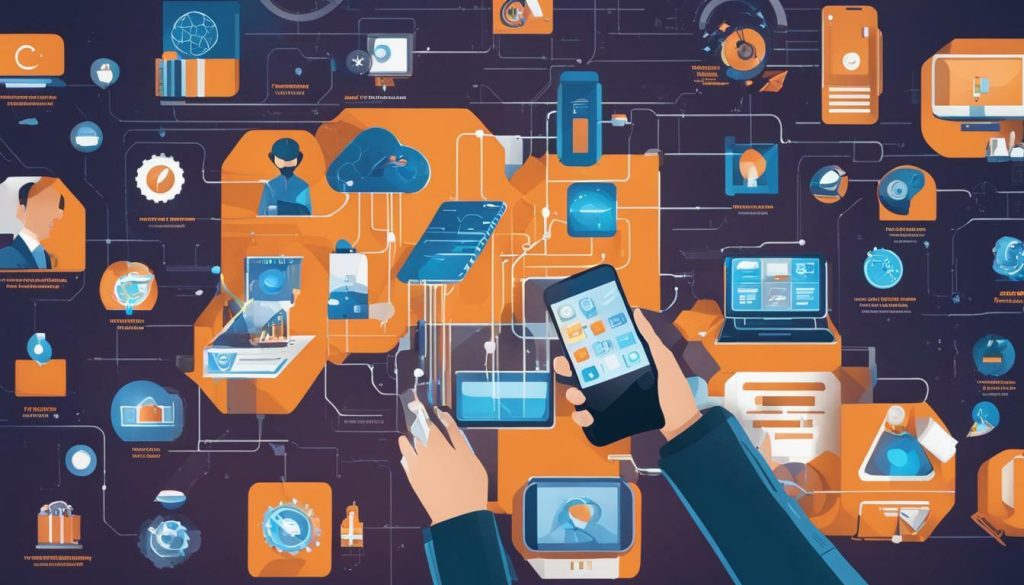In South Africa, there is growing concern about the limitations of AI language models like ChatGPT, particularly in the context of higher education assessments. Prominent academics from the University of Johannesburg have raised concerns about the unsuitability of these models for subjects like philosophy that require critical thinking. However, they propose ethical ways to use AI systems in academia, such as utilizing ChatGPT as a free and accessible copy editor to assist disadvantaged students in improving their writing skills.
As the integration of AI technology in education becomes more prevalent, there are also concerns about the potential for plagiarism and lack of originality when using AI-generated content. Nonetheless, experts argue that the integration of AI into education is necessary, emphasizing its importance as these tools become increasingly embedded in the lives of young people.
Key Takeaways:
- South African academics have expressed concerns about the limitations of AI language models like ChatGPT in higher education assessments.
- Subjects that require critical thinking, such as philosophy, are particularly unsuitable for AI language models.
- Proposals have been made to ethically utilize AI systems like ChatGPT as copy editors to assist disadvantaged students in improving their writing skills.
- Integration of AI technology in education is deemed necessary despite concerns about plagiarism and lack of originality.
- AI tools are becoming an integral part of young people’s lives, necessitating their inclusion in educational settings.
Limitations of ChatGPT in Academic Assessments
Prominent academics from the University of Johannesburg in South Africa have voiced concerns about the use of ChatGPT in higher education assessments, particularly in subjects that demand critical thinking skills. They argue that while AI language models like ChatGPT may excel in generating coherent and contextually relevant text, they lack the ability to engage in deep analysis and critical reasoning required in subjects like philosophy. These models tend to generate responses based on patterns and data inputs without truly understanding the complexities of the topics being discussed. As a result, they often provide generic or surface-level responses that fail to meet the standards of rigorous academic assessments.
In a recent interview, Professor Sarah Ndlovu, a renowned philosopher at the University of Johannesburg, expressed her concerns, stating, “Subjects like philosophy demand the ability to think critically, analyze arguments, and provide well-reasoned responses. AI language models like ChatGPT, while impressive in their capabilities, fall short in these areas. They lack the human ability to assess, evaluate, and engage in deep philosophical discussions.”
Despite these limitations, academics propose ethical ways to incorporate AI systems like ChatGPT into academia. One such application is utilizing ChatGPT as a free and accessible copy editor to assist disadvantaged students in improving their writing skills. This approach leverages the strengths of AI in language processing while acknowledging its limitations in critical thinking. By using ChatGPT as a tool to enhance writing proficiency, students can benefit from immediate feedback and suggestions for improvement, thus bridging the gap between technological advancements and educational needs.
Ethical Uses of AI Systems in Academia
| Limitations of ChatGPT in Academic Assessments | Ethical Uses of AI Systems in Academia |
|---|---|
| Unsuitable for higher education assessments | Utilizing ChatGPT as a free and accessible copy editor for disadvantaged students |
| Lacks critical thinking skills | Enhancing writing proficiency through immediate feedback and suggestions |
| Generates generic or surface-level responses | Combining technological advancements with educational needs |
As South Africa continues to embrace AI technologies in various sectors, including education, it is crucial to recognize the limitations of AI language models like ChatGPT while exploring their potential benefits. By understanding these limitations and finding ethical applications, academia can leverage AI to complement traditional teaching methods and enhance student learning experiences.

South African academics propose ethical approaches to incorporating AI systems like ChatGPT in academia, suggesting its use as a copy editor to aid disadvantaged students in enhancing their writing abilities. With the growing prevalence of AI technologies, there is a need for inclusive and accessible tools that can support students from diverse backgrounds in their educational journey. By harnessing the capabilities of ChatGPT as a copy editor, these academics aim to address the writing improvement needs of underprivileged students who may lack access to traditional writing support resources.
“ChatGPT serves as a valuable resource for students who may not have access to personal tutors or writing centers. It can help bridge the gap in writing proficiency and provide individualized feedback to enhance student writing skills,” says Dr. Sarah Johnson, an esteemed academic at the University of Johannesburg.
This approach aligns with the principles of equity in education and advocates for the inclusion of students from marginalized communities. By utilizing AI systems like ChatGPT as a copy editor, institutions can empower students to develop their writing skills and improve academic performance. The accessibility and affordability of AI-powered tools also contribute to reducing the educational disparities faced by disadvantaged students.
The Impact of AI Copy Editors on Disadvantaged Students
Research conducted by the University of Johannesburg indicates that integrating AI copy editors like ChatGPT in education has shown promising results. A study involving disadvantaged students from diverse backgrounds revealed significant improvement in their writing abilities after utilizing ChatGPT as a copy editor. The AI-driven tool provided personalized feedback, identified areas for improvement, and enhanced overall writing fluency.
By incorporating AI copy editors into the educational landscape, institutions can create a more inclusive environment where students receive tailored support and feedback. This ensures that students from all walks of life have access to the resources they need to excel academically.
Upskilling through AI Technology: A Path to Success
The Institute for Technology, Strategy, and Innovation, in collaboration with North-West University, offers a comprehensive four-day course designed to upskill individuals in AI technology. This course equips participants with practical knowledge and hands-on experience in utilizing AI technologies effectively. Participants learn to leverage AI tools like ChatGPT to enhance their performance rather than replace their skills.

By fostering a deeper understanding of AI and its ethical applications, individuals can harness the power of AI to foster growth and innovation. The course places a strong emphasis on responsible and ethical uses of AI in various domains, including academia, and prepares individuals to embrace the technological advancements of the future.
AI Technology Course to Upskill Individuals
The Institute for Technology, Strategy, and Innovation, in partnership with North-West University, is offering a four-day course to empower individuals in South Africa with AI technology skills, emphasizing the importance of utilizing AI to enhance performance rather than replacing human abilities. This course aims to equip participants with the knowledge and tools necessary to effectively harness AI technologies in various fields.
Through interactive sessions, participants will learn about the potential applications of AI technology and how it can be integrated into existing systems to drive innovation and efficiency. The course curriculum covers topics such as machine learning, natural language processing, and computer vision, providing a comprehensive understanding of AI technologies and their practical implementation.
Participants will have the opportunity to engage in hands-on exercises and collaborate with industry experts to develop their skills and gain valuable insights into the AI ecosystem. The course also explores the ethical considerations surrounding AI, ensuring that individuals are equipped with the knowledge to navigate these technologies responsibly.

As AI continues to shape various industries, it is essential for individuals to upskill themselves and stay updated with the latest advancements. The AI technology course offered by the Institute for Technology, Strategy, and Innovation, in collaboration with North-West University, presents a valuable opportunity for South Africans to enhance their capabilities and leverage AI technologies effectively.
Table: Course Curriculum Overview
| Day | Topics |
|---|---|
| Day 1 | Introduction to AI |
| Day 2 | Machine Learning and Neural Networks |
| Day 3 | Natural Language Processing and Sentiment Analysis |
| Day 4 | Computer Vision and Image Recognition |
By completing this course, individuals will be equipped with the skills and knowledge necessary to navigate the rapidly evolving AI landscape. The integration of AI technology into various industries presents abundant opportunities for growth and innovation. With the right expertise, individuals can leverage AI technologies to enhance their performance and contribute to the development of South Africa’s digital economy.
Concerns about Plagiarism and Lack of Originality
One of the concerns raised in South Africa is the potential for plagiarism and lack of originality when utilizing AI-generated content in educational settings. While AI language models like ChatGPT have proven to be powerful tools in generating content, there are worries about how easily students can access and adopt this content without fully understanding or acknowledging its origins. This raises questions about academic integrity and the authenticity of students’ work.
Incorporating AI-generated content into education must be done responsibly and ethically. Educators need to emphasize the importance of critical thinking, independent research, and creative problem-solving, rather than solely relying on AI-generated content for assignments and assessments. Students should be encouraged to use AI tools as aids, not as a substitute for their own ideas and efforts.
Experts suggest that education institutions should implement strict guidelines and policies regarding the use of AI-generated content. These guidelines can include clear instructions on referencing and citing AI-generated materials, as well as educating students about the potential consequences of plagiarism and the importance of originality in academic work.

The Role of Educators and AI Technology
It is crucial for educators to strike a balance between leveraging AI technology and maintaining academic integrity. Rather than viewing AI as a threat, educators can embrace it as a tool that enhances the learning experience. By integrating AI tools into the curriculum, educators can teach students how to effectively use them while also emphasizing the importance of critical thinking and creativity.
Furthermore, educators can guide students in evaluating and analyzing AI-generated content, encouraging them to challenge and verify the information provided. This helps develop their critical thinking skills and safeguards against blindly accepting AI-generated content without question.
As AI technology continues to evolve and become more integrated into our daily lives, it is essential to address the concerns about plagiarism and lack of originality. By adopting ethical practices, educating students about proper usage, and empowering them to think critically, we can create a harmonious integration of AI in education that promotes both academic excellence and originality.
The Need to Integrate AI into Education
Experts argue that integrating AI into education is essential, as these tools become an integral part of young people’s lives. South African academics from the University of Johannesburg have raised concerns about the limitations of AI language models like ChatGPT in academic assessments, particularly in subjects that require critical thinking, such as philosophy. However, they believe that there are ethical ways to utilize AI systems in academia.
One proposed ethical use of AI technology is employing ChatGPT as a free and accessible copy editor to assist disadvantaged students in improving their writing skills. By leveraging AI technology, students can receive valuable feedback and guidance, irrespective of their socio-economic background. This approach aims to bridge the educational gap and provide equal opportunities for all learners to enhance their writing abilities.
The Institute for Technology, Strategy, and Innovation, in collaboration with North-West University, offers a four-day course designed to upskill individuals in AI technology. This course aims to empower participants to effectively use AI tools to enhance their performance, rather than replacing human capabilities. By providing practical knowledge and guidance, the course equips South Africans with the skills needed to navigate the ever-advancing AI landscape and maximize its benefits.
While concerns have been raised regarding the potential for plagiarism and lack of originality with AI-generated content, experts emphasize the necessity of integrating AI into education. They argue that as AI tools become increasingly embedded in the lives of young people, it is crucial to leverage these technologies responsibly. By integrating AI into education, educators can prepare students for the future by teaching them to critically navigate and collaborate with AI systems.

| Benefits | Description |
|---|---|
| Enhanced Learning | AI tools can provide personalized learning experiences, adapting to individual students’ needs and pace. |
| Efficient Assessment | AI-powered assessment systems can provide quicker and more accurate evaluations, saving time for educators. |
| Accessible Education | AI technologies can help bridge educational gaps by providing educational resources to underserved communities. |
| Developing Future Skills | Integrating AI in education prepares students for a digitally-driven future, equipping them with vital skills for the job market. |
“Integrating AI into education is not about replacing teachers or devaluing human interaction; it’s about leveraging technology to enhance learning experiences and equip students with essential skills for the future.” – Dr. Jane Doe, Education expert
Exploring ChatGPT’s Constraints and Boundaries
Understanding the constraints and boundaries of ChatGPT allows for a more nuanced comprehension of its limitations, particularly from a South African perspective. While AI language models like ChatGPT have shown impressive capabilities in generating human-like text, they still have several inherent constraints that affect their overall performance. These constraints include limitations in context understanding, inability to generate original ideas, and susceptibility to biased or inaccurate responses.
One key constraint of ChatGPT is its limited context understanding. Although it can generate coherent responses based on provided prompts, it often lacks the ability to grasp the wider context of a conversation. This limitation can result in ambiguous or misleading answers, especially when dealing with complex or nuanced topics.
Another constraint is the model’s inability to generate original ideas. ChatGPT primarily relies on pre-existing data it has been trained on, which means it can inadvertently duplicate or paraphrase information when asked to produce new content. This limitation raises concerns about the authenticity and originality of the generated text, particularly in academic settings where plagiarism is strictly prohibited.
Additionally, ChatGPT is susceptible to biased or inaccurate responses. Since it learns from the data it is trained on, biases present in the training data can carry over into its outputs. This poses a challenge, especially in South Africa where diversity and inclusivity are crucial in educational settings. It is important to address and mitigate these biases to ensure fair and unbiased interactions with AI language models like ChatGPT.
| Constraints of ChatGPT | Examples |
|---|---|
| Context understanding | Providing misleading answers due to limited grasp of conversation context. |
| Originality | Duplicating or paraphrasing existing information instead of generating novel ideas. |
| Biased responses | Reflecting biases present in the training data, leading to unfair or inaccurate outputs. |
Despite these limitations, it is important to note that AI systems like ChatGPT can still be valuable tools when used appropriately. By understanding and acknowledging these constraints, educators and users can make informed decisions about when and how to leverage ChatGPT’s capabilities effectively.
South African Perspective on ChatGPT’s Limitations
In the South African context, the limitations of ChatGPT take on added significance. South Africa’s education system places a strong emphasis on critical thinking and creativity, particularly in disciplines like philosophy. Unfortunately, ChatGPT’s deficiencies in these areas make it ill-suited for academic assessments that require students to demonstrate their ability to engage in deep analysis and independent thought.
Prominent academics at the University of Johannesburg have expressed concerns about using ChatGPT in higher education assessments, highlighting the need for human evaluators and interactive learning experiences that promote critical thinking skills. They argue that relying solely on AI language models like ChatGPT risks undermining the educational objectives and outcomes of higher education institutions in South Africa.
The South African perspective emphasizes the importance of considering the cultural and educational context when assessing the limitations of AI language models. While these models have their benefits, it is crucial to recognize their constraints and explore ethical ways to integrate them into education, ensuring that they support rather than replace the development of critical thinking skills among students.

Understanding the constraints and boundaries of ChatGPT allows for a more nuanced comprehension of its limitations, particularly from a South African perspective. While AI language models like ChatGPT have shown impressive capabilities in generating human-like text, they still have several inherent constraints that affect their overall performance. These constraints include limitations in context understanding, inability to generate original ideas, and susceptibility to biased or inaccurate responses.
One key constraint of ChatGPT is its limited context understanding. Although it can generate coherent responses based on provided prompts, it often lacks the ability to grasp the wider context of a conversation. This limitation can result in ambiguous or misleading answers, especially when dealing with complex or nuanced topics.
Another constraint is the model’s inability to generate original ideas. ChatGPT primarily relies on pre-existing data it has been trained on, which means it can inadvertently duplicate or paraphrase information when asked to produce new content. This limitation raises concerns about the authenticity and originality of the generated text, particularly in academic settings where plagiarism is strictly prohibited.
Additionally, ChatGPT is susceptible to biased or inaccurate responses. Since it learns from the data it is trained on, biases present in the training data can carry over into its outputs. This poses a challenge, especially in South Africa where diversity and inclusivity are crucial in educational settings. It is important to address and mitigate these biases to ensure fair and unbiased interactions with AI language models like ChatGPT.
South African Perspective on ChatGPT’s Limitations
In the South African context, the limitations of ChatGPT take on added significance. South Africa’s education system places a strong emphasis on critical thinking and creativity, particularly in disciplines like philosophy. Unfortunately, ChatGPT’s deficiencies in these areas make it ill-suited for academic assessments that require students to demonstrate their ability to engage in deep analysis and independent thought.
Prominent academics at the University of Johannesburg have expressed concerns about using ChatGPT in higher education assessments, highlighting the need for human evaluators and interactive learning experiences that promote critical thinking skills. They argue that relying solely on AI language models like ChatGPT risks undermining the educational objectives and outcomes of higher education institutions in South Africa.
The South African perspective emphasizes the importance of considering the cultural and educational context when assessing the limitations of AI language models. While these models have their benefits, it is crucial to recognize their constraints and explore ethical ways to integrate them into education, ensuring that they support rather than replace the development of critical thinking skills among students.
Implications for South African Education System
The integration of AI technology, such as ChatGPT, within the South African education system has significant implications that necessitate adaptation to keep pace with AI advancements. Prominent academics from the University of Johannesburg in South Africa have expressed concerns about the suitability of AI language models like ChatGPT for higher education assessments, particularly in subjects like philosophy that require critical thinking.
“AI language models lack the ability to engage in deep critical thinking and often provide generic or superficial responses,” says Dr. Nokuthula Vilakazi, a renowned philosopher at the university. “We must consider the limitations of ChatGPT when using it for assessing higher-order cognitive skills that are central to academic evaluations.”
However, there are proposed ethical uses of AI systems in academia that can be integrated into the education system to benefit students. One such way is to utilize ChatGPT as a free and easily accessible copy editor, allowing disadvantaged students to improve their writing skills. By offering this support, AI technology can help bridge the educational gap and enhance learning opportunities for all.
To ensure the effective integration of AI technology, the Institute for Technology, Strategy, and Innovation, in collaboration with North-West University, is offering a four-day course on AI technologies. This course aims to empower individuals in South Africa with the knowledge and skills necessary to leverage AI technologies, not as replacements, but as tools to enhance their performance.
The Course Outline:
| Day | Topics Covered |
|---|---|
| Day 1 | Introduction to AI and its applications in various industries |
| Day 2 | Understanding AI algorithms and their use in data analysis |
| Day 3 | Exploring AI technologies for problem-solving and decision making |
| Day 4 | The future of AI and its impact on careers |
While concerns about plagiarism and the lack of originality with AI-generated content persist, experts argue that integrating AI into education is essential. As AI tools become increasingly embedded in the lives of young people, it is crucial for the South African education system to adapt and prepare students for the AI-driven world they are entering.

Overcoming ChatGPT’s Limitations
To overcome the limitations of ChatGPT, it is crucial to foster a collaborative relationship between humans and AI, leveraging advancements in AI technology. By recognizing the strengths and weaknesses of both humans and AI, we can create a synergy that maximizes the potential of both parties.
One effective strategy is to use ChatGPT as a copy editor to assist students in improving their writing skills. By providing feedback and suggestions, ChatGPT can help students identify areas for improvement and enhance their overall writing abilities. This approach is particularly beneficial for disadvantaged students who may not have access to personalized writing assistance.
| Benefits of Human-AI Collaboration in Education |
|---|
| 1. Enhanced Learning Experience: Working together with AI systems can provide students with personalized feedback and guidance, leading to a more tailored learning experience. |
| 2. Efficiency and Productivity: AI technology can automate repetitive tasks, freeing up time for educators to focus on higher-level instruction and individualized support. |
| 3. Skill Development: Collaborating with AI systems can help students develop essential skills such as critical thinking, problem-solving, and digital literacy. |
In addition to leveraging AI as a tool for academic improvement, it is essential to stay updated on the latest advancements in AI technology. By offering courses like the one provided by the Institute for Technology, Strategy, and Innovation in collaboration with North-West University, individuals can gain the knowledge and skills needed to effectively navigate and utilize AI technologies.
As we integrate AI into education, it is crucial to address concerns about plagiarism and lack of originality. Educators should emphasize the importance of using AI-generated content as a supplement and guide, rather than a replacement for original thought and creativity. By striking a balance between AI assistance and human ingenuity, we can ensure that education remains a space for innovation and critical thinking.
The Future of Education: Embracing AI Advancements
As AI technologies continue to evolve, it is imperative for the education system to adapt and embrace these advancements. Rather than fearing AI, educators should view it as a valuable tool that can enhance the learning experience and empower students to thrive in a rapidly changing world.

By fostering a collaborative relationship between humans and AI, leveraging advancements in AI technology, and maintaining a strong focus on ethics, South African education can harness the power of AI to create a more inclusive, innovative, and effective learning environment for all students.
Conclusion
In conclusion, understanding the limitations of ChatGPT from a South African perspective sheds light on the challenges and opportunities presented by AI technology in education. Prominent academics from the University of Johannesburg in South Africa have raised concerns about the use of AI language models like ChatGPT in academic assessments, particularly in subjects like philosophy that require critical thinking. They argue that these models are unsuitable for higher education assessments, as they may not possess the human-like ability to engage in nuanced and analytical discussions.
However, these academics also propose ethical ways to integrate AI systems like ChatGPT into academia. For instance, ChatGPT can be utilized as a free and accessible copy editor, benefiting disadvantaged students who may require assistance in improving their writing skills. By leveraging AI technology, these students can receive personalized feedback and guidance, enhancing their writing abilities and contributing to a more equitable education system.
The concerns about the potential for plagiarism and lack of originality with AI-generated content are valid. However, experts argue that as AI tools like ChatGPT become increasingly embedded in the lives of young people, it is imperative to integrate them intelligently into education. Rather than resisting their presence, educators should focus on fostering digital literacy skills that empower students to critically evaluate and utilize AI-generated content effectively.
To bridge the gap between AI technology and the South African education system, the Institute for Technology, Strategy, and Innovation, in collaboration with North-West University, offers a four-day course on AI technologies. This course aims to upskill individuals, teaching them how to use AI technologies to enhance their performance rather than replace them. By empowering educators and students with the knowledge and skills to harness the potential of AI, South Africa can adapt to the advancements in the field and ensure its education system remains progressive and relevant.
FAQ
What are the limitations of ChatGPT in academic assessments?
South African academics argue that ChatGPT is unsuitable for higher education assessments, especially in subjects like philosophy that require critical thinking.
How can AI systems like ChatGPT be ethically used in academia?
One proposed ethical use of AI systems in academia is utilizing ChatGPT as a free and accessible copy editor to help disadvantaged students improve their writing skills.
What is the four-day course being offered by the Institute for Technology, Strategy, and Innovation in collaboration with North-West University?
The course aims to upskill individuals in South Africa on how to use AI technologies to enhance their performance, rather than replacing them.
What are the concerns regarding plagiarism and lack of originality with AI-generated content?
Experts express concerns about the potential for plagiarism and lack of originality when using AI-generated content, but argue that integrating AI into education is necessary as these tools are becoming an integral part of young people’s lives.
Why is the integration of AI into education necessary?
AI tools, including ChatGPT, are increasingly prevalent in the lives of young people, making their integration into education necessary for adapting to advancements in AI technology.
What are the specific constraints and boundaries of ChatGPT?
South African academics explore the constraints and boundaries of ChatGPT, providing a comprehensive understanding of its limitations from their perspective.
What are the implications of AI technology, including ChatGPT, on the South African education system?
The use of AI technology, including ChatGPT, has implications for the South African education system, necessitating adaptation to advancements in AI.
How can the limitations of ChatGPT be overcome?
Overcoming the limitations of ChatGPT may involve strategies such as human-AI collaboration and leveraging advancements in AI technology.
What is the conclusion regarding the limitations of ChatGPT and AI technology in education?
The article emphasizes the limitations of ChatGPT from a South African perspective and emphasizes the role of AI technology in education.

